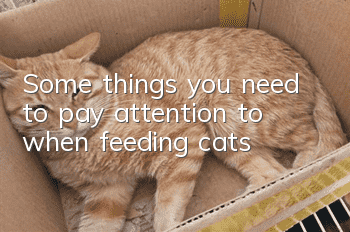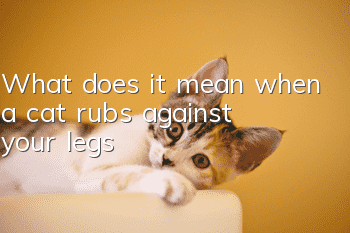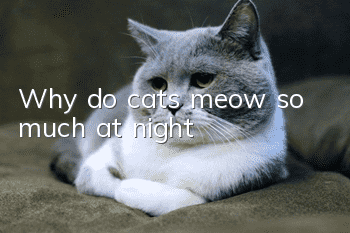Some things you need to pay attention to when feeding cats

Cats are very picky about food, and owners will naturally feel headaches when choosing cat food. The wide variety of cat food on the market can be roughly divided into three types: canned meat, semi-mixed food and dry food. However, these foods should only be used as part of cat food, because the ideal cat food should be added once or twice a week. Fresh cat food, such as meat and fish, because these foods contain high protein and can provide cats with heat energy and amino acids, which are very important for the development of cats. However, in order to prevent cats from contracting toxoplasmosis, all meat Fish must be cooked and cut into fine pieces for cats to chew. As for fish, owners should carefully remove the fish bones and bones to prevent cats from swallowing fish bones and getting stabbed.
There are some things that cats must pay attention to when eating:
1. Cats fed liver plus carrots are prone to rickets and poisoning. According to research, the correct ratio of calcium to phosphorus in cat food is approximately 1:1, while liver contains less calcium and more phosphorus. The ratio of calcium to phosphorus in fresh liver reaches 1:36. If the cat eats liver for a long time , will lead to calcium deficiency.
The external manifestations of calcium deficiency are: (1) Weakened gastric function, loss of appetite, and the body becomes slimmer.
(2) No longer jumping around, afraid of heights, and dare not jump from high places. Young cats with severe calcium deficiency will have sunken waist and shoulders and narrow pelvic cavity, leading to constipation. In the cold season, young cats are also prone to hind limb weakness, and severe cases may lead to paralysis. This is what we often call rickets.
The liver itself contains a large amount of vitamin A. Carrots contain B-carotene, and one molecule of carotene can be decomposed into two vitamin A molecules in the cat's body. If cats are fed liver and carrots for a long time, the vitamin A in the cat's body will decrease. In severe overdose, cats are prone to vitamin A poisoning.
If your cat already likes to eat liver, you can mix new cat food and liver for the cat to eat in about 10 days. From now on, increase the amount of new food and reduce the amount of liver every day until the cat completely adapts to the new food.
2. Cats that eat too much fish for a long time will suffer from yellow fat syndrome. Eating only fish without eating other foods will make cats lack vitamin B1, because raw fish will produce An enzyme that destroys vitamin B1, a deficiency of which can lead to seizures, heart disease, intermittent shock and even death in cats. Eating raw fish and meat without timely deworming will also cause unnecessary parasite troubles. Parasite infection can cause systemic jaundice and hepatitis. Liver disease can also lead to liver ascites and kidney disease, and these are definitely terminal illnesses for cats. (Parents who feed raw beef regularly deworm in time)
3. Cats can eat shrimp once in a while. If they haven’t eaten for a long time, feed them less. EveryEvery cat’s digestive system is different. Because there is a possibility of being unable to digest high protein, causing vomiting and indigestion. It is best for pets to eat less seafood, as it can easily cause digestive system problems. Such as diarrhea, vomiting, etc. In addition, eating seafood can cause allergies in many pets. The main symptoms are redness and itchiness of the skin, small bumps, visible mucous membrane flushing, etc. Even if it is cooked, it cannot be fed because some allergens in seafood are exposed to high temperatures. What cannot be destroyed is still allergenic. If eaten regularly, it will increase the burden on the kidneys, and some may cause urethritis, stones, etc.
Unbalanced mineral intake in cats may have a certain impact on the increase in the amount of stones in the body. The imbalance of nutrients in home-cooked meals, especially the mineral content, is more likely to cause the formation of high-concentration crystals in urine, leading to urinary tract diseases.
Dangerous foods that cats should not eat
1. Green onions and onions:Contain ingredients that can destroy red blood cells, which can cause anemia and even death in cats
2. Larger bones of chicken and fish:The cuts on chicken bones are very sharp and may pierce the throat or digestive tract, which is very dangerous
3. Raw pork:It can easily cause indigestion and may also be infected with Toxoplasma gondii
4. Raw squid and raw octopus: Will expand 10 times in the stomach, causing indigestion and easily causing stomach expansion
5. Abalone and salamander snail: can cause severe dermatitis
6. High-salt foods: Can damage the gastric mucosa, burden the heart and kidneys, and affect lifespan
7. Spices: When the fragrance is too strong, it will paralyze the sense of smell and cause great irritation to the gastrointestinal tract
8. Sweets, coffee, and tea: can cause heart disease and dental plaque, and chocolate can even poison cats
9. Milk consumed by humans: It may cause diarrhea. Adult cats should be more careful than kittens. If it is lactose-free milk, it can be consumed
10. Alcoholic beverages: Can paralyze nerves and may cause coma or even death
11. Grapes and raisins:Toxins cause kidney damage
12. Macadamia nuts: Can damage the digestive system and affect the nerve and digestive system, causing temporary paralysis
13. Raw eggs: Contain avidin, which may cause malabsorption of vitamin B, which may lead to skin and hair problems. Raw eggs also contain Salmonella, so it is best to avoid them.
- Do you need to wipe your cat after pooping?
- Can’t cats eat pork liver?
- How to train a cat to use the litter box
- Do cats have feelings? (Do cats that have been raised for a few days have feelings?)
- What causes neutered male cats to urinate suddenly?
- What causes retching in cats? Don’t ignore cats’ frequent retching!
- What to eat for Maine Coon cats
- Can male cats be spayed or neutered when they are in heat?
- What should I do if my cat doesn’t eat or drink water due to feline plague?
- How old can a cat eat lecithin?



